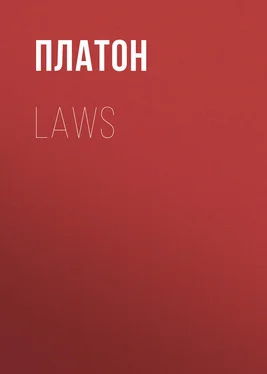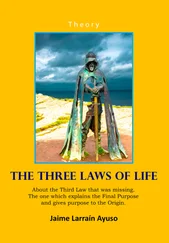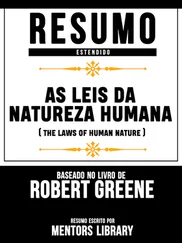Платон - Laws
Здесь есть возможность читать онлайн «Платон - Laws» — ознакомительный отрывок электронной книги совершенно бесплатно, а после прочтения отрывка купить полную версию. В некоторых случаях можно слушать аудио, скачать через торрент в формате fb2 и присутствует краткое содержание. Жанр: Философия, foreign_antique, foreign_prose, на английском языке. Описание произведения, (предисловие) а так же отзывы посетителей доступны на портале библиотеки ЛибКат.
- Название:Laws
- Автор:
- Жанр:
- Год:неизвестен
- ISBN:нет данных
- Рейтинг книги:5 / 5. Голосов: 1
-
Избранное:Добавить в избранное
- Отзывы:
-
Ваша оценка:
- 100
- 1
- 2
- 3
- 4
- 5
Laws: краткое содержание, описание и аннотация
Предлагаем к чтению аннотацию, описание, краткое содержание или предисловие (зависит от того, что написал сам автор книги «Laws»). Если вы не нашли необходимую информацию о книге — напишите в комментариях, мы постараемся отыскать её.
Laws — читать онлайн ознакомительный отрывок
Ниже представлен текст книги, разбитый по страницам. Система сохранения места последней прочитанной страницы, позволяет с удобством читать онлайн бесплатно книгу «Laws», без необходимости каждый раз заново искать на чём Вы остановились. Поставьте закладку, и сможете в любой момент перейти на страницу, на которой закончили чтение.
Интервал:
Закладка:
The fictions of the Laws have no longer the verisimilitude which is characteristic of the Phaedrus and the Timaeus, or even of the Statesman. We can hardly suppose that an educated Athenian would have placed the visit of Epimenides to Athens ten years before the Persian war, or have imagined that a war with Messene prevented the Lacedaemonians from coming to the rescue of Hellas. The narrative of the origin of the Dorian institutions, which are said to have been due to a fear of the growing power of the Assyrians, is a plausible invention, which may be compared with the tale of the island of Atlantis and the poem of Solon, but is not accredited by similar arts of deception. The other statement that the Dorians were Achaean exiles assembled by Dorieus, and the assertion that Troy was included in the Assyrian Empire, have some foundation (compare for the latter point, Diod. Sicul.). Nor is there anywhere in the Laws that lively enargeia, that vivid mise en scene, which is as characteristic of Plato as of some modern novelists.
The old men are afraid of the ridicule which 'will fall on their heads more than enough,' and they do not often indulge in a joke. In one of the few which occur, the book of the Laws, if left incomplete, is compared to a monster wandering about without a head. But we no longer breathe the atmosphere of humour which pervades the Symposium and the Euthydemus, in which we pass within a few sentences from the broadest Aristophanic joke to the subtlest refinement of wit and fancy; instead of this, in the Laws an impression of baldness and feebleness is often left upon our minds. Some of the most amusing descriptions, as, for example, of children roaring for the first three years of life; or of the Athenians walking into the country with fighting-cocks under their arms; or of the slave doctor who knocks about his patients finely; and the gentleman doctor who courteously persuades them; or of the way of keeping order in the theatre, 'by a hint from a stick,' are narrated with a commonplace gravity; but where we find this sort of dry humour we shall not be far wrong in thinking that the writer intended to make us laugh. The seriousness of age takes the place of the jollity of youth. Life should have holidays and festivals; yet we rebuke ourselves when we laugh, and take our pleasures sadly. The irony of the earlier dialogues, of which some traces occur in the tenth book, is replaced by a severity which hardly condescends to regard human things. 'Let us say, if you please, that man is of some account, but I was speaking of him in comparison with God.'
The imagery and illustrations are poor in themselves, and are not assisted by the surrounding phraseology. We have seen how in the Republic, and in the earlier dialogues, figures of speech such as 'the wave,' 'the drone,' 'the chase,' 'the bride,' appear and reappear at intervals. Notes are struck which are repeated from time to time, as in a strain of music. There is none of this subtle art in the Laws. The illustrations, such as the two kinds of doctors, 'the three kinds of funerals,' the fear potion, the puppet, the painter leaving a successor to restore his picture, the 'person stopping to consider where three ways meet,' the 'old laws about water of which he will not divert the course,' can hardly be said to do much credit to Plato's invention. The citations from the poets have lost that fanciful character which gave them their charm in the earlier dialogues. We are tired of images taken from the arts of navigation, or archery, or weaving, or painting, or medicine, or music. Yet the comparisons of life to a tragedy, or of the working of mind to the revolution of the self-moved, or of the aged parent to the image of a God dwelling in the house, or the reflection that 'man is made to be the plaything of God, and that this rightly considered is the best of him,' have great beauty.
2. The clumsiness of the style is exhibited in frequent mannerisms and repetitions. The perfection of the Platonic dialogue consists in the accuracy with which the question and answer are fitted into one another, and the regularity with which the steps of the argument succeed one another. This finish of style is no longer discernible in the Laws. There is a want of variety in the answers; nothing can be drawn out of the respondents but 'Yes' or 'No,' 'True,' 'To be sure,' etc.; the insipid forms, 'What do you mean?' 'To what are you referring?' are constantly returning. Again and again the speaker is charged, or charges himself, with obscurity; and he repeats again and again that he will explain his views more clearly. The process of thought which should be latent in the mind of the writer appears on the surface. In several passages the Athenian praises himself in the most unblushing manner, very unlike the irony of the earlier dialogues, as when he declares that 'the laws are a divine work given by some inspiration of the Gods,' and that 'youth should commit them to memory instead of the compositions of the poets.' The prosopopoeia which is adopted by Plato in the Protagoras and other dialogues is repeated until we grow weary of it. The legislator is always addressing the speakers or the youth of the state, and the speakers are constantly making addresses to the legislator. A tendency to a paradoxical manner of statement is also observable. 'We must have drinking,' 'we must have a virtuous tyrant' – this is too much for the duller wits of the Lacedaemonian and Cretan, who at first start back in surprise. More than in any other writing of Plato the tone is hortatory; the laws are sermons as well as laws; they are considered to have a religious sanction, and to rest upon a religious sentiment in the mind of the citizens. The words of the Athenian are attributed to the Lacedaemonian and Cretan, who are supposed to have made them their own, after the manner of the earlier dialogues. Resumptions of subjects which have been half disposed of in a previous passage constantly occur: the arrangement has neither the clearness of art nor the freedom of nature. Irrelevant remarks are made here and there, or illustrations used which are not properly fitted in. The dialogue is generally weak and laboured, and is in the later books fairly given up, apparently, because unsuited to the subject of the work. The long speeches or sermons of the Athenian, often extending over several pages, have never the grace and harmony which are exhibited in the earlier dialogues. For Plato is incapable of sustained composition; his genius is dramatic rather than oratorical; he can converse, but he cannot make a speech. Even the Timaeus, which is one of his most finished works, is full of abrupt transitions. There is the same kind of difference between the dialogue and the continuous discourse of Plato as between the narrative and speeches of Thucydides.
3. The perfection of style is variety in unity, freedom, ease, clearness, the power of saying anything, and of striking any note in the scale of human feelings without impropriety; and such is the divine gift of language possessed by Plato in the Symposium and Phaedrus. From this there are many fallings-off in the Laws: first, in the structure of the sentences, which are rhythmical and monotonous, – the formal and sophistical manner of the age is superseding the natural genius of Plato: secondly, many of them are of enormous length, and the latter end often forgets the beginning of them, – they seem never to have received the second thoughts of the author; either the emphasis is wrongly placed, or there is a want of point in a clause; or an absolute case occurs which is not properly separated from the rest of the sentence; or words are aggregated in a manner which fails to show their relation to one another; or the connecting particles are omitted at the beginning of sentences; the uses of the relative and antecedent are more indistinct, the changes of person and number more frequent, examples of pleonasm, tautology, and periphrasis, antitheses of positive and negative, false emphasis, and other affectations, are more numerous than in the other writings of Plato; there is also a more common and sometimes unmeaning use of qualifying formulae, os epos eipein, kata dunamin, and of double expressions, pante pantos, oudame oudamos, opos kai ope – these are too numerous to be attributed to errors in the text; again, there is an over-curious adjustment of verb and participle, noun and epithet, and other artificial forms of cadence and expression take the place of natural variety: thirdly, the absence of metaphorical language is remarkable – the style is not devoid of ornament, but the ornament is of a debased rhetorical kind, patched on to instead of growing out of the subject; there is a great command of words, and a laboured use of them; forced attempts at metaphor occur in several passages, – e.g. parocheteuein logois; ta men os tithemena ta d os paratithemena; oinos kolazomenos upo nephontos eterou theou; the plays on the word nomos = nou dianome, ode etara: fourthly, there is a foolish extravagance of language in other passages, – 'the swinish ignorance of arithmetic;' 'the justice and suitableness of the discourse on laws;' over-emphasis; 'best of Greeks,' said of all the Greeks, and the like: fifthly, poor and insipid illustrations are also common: sixthly, we may observe an excessive use of climax and hyperbole, aischron legein chre pros autous doulon te kai doulen kai paida kai ei pos oion te olen ten oikian: dokei touto to epitedeuma kata phusin tas peri ta aphrodisia edonas ou monon anthropon alla kai therion diephtharkenai.
Читать дальшеИнтервал:
Закладка:
Похожие книги на «Laws»
Представляем Вашему вниманию похожие книги на «Laws» списком для выбора. Мы отобрали схожую по названию и смыслу литературу в надежде предоставить читателям больше вариантов отыскать новые, интересные, ещё непрочитанные произведения.
Обсуждение, отзывы о книге «Laws» и просто собственные мнения читателей. Оставьте ваши комментарии, напишите, что Вы думаете о произведении, его смысле или главных героях. Укажите что конкретно понравилось, а что нет, и почему Вы так считаете.












